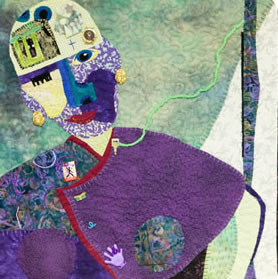One Stitch at a Time
Using art to find meaning in survivorship

Four hashmarks on the pole in Harriett DeRose's basement studio track the growth of her granddaughters. To them, she's "Mangi." To their grandfather, Anthony, she's "the most talented person he's ever met." Look across the room, and you'll be introduced to a different part of DeRose: a quilted self-portrait that was key in helping DeRose find a way to cope with ovarian cancer.
DeRose is now cancer-free, although she participates in a clinical trial to study the effectiveness of continued chemotherapy to prevent recurrence. But while she was in active treatment, she turned to quilting to help her make sense of everything she was going through as a result of her diagnosis.
"It was very, very cathartic for me," DeRose said of the five wall hangings she made to mark her cancer experience. "It's like in counseling when they say, 'Once you've said it, whatever it is isn't so bad.' I felt like having said it, I was able to relax a little about it."
In her self-portrait, "In My Mind's Eyes," DeRose sewed meaning into every detail: One eye is shut, while one remains wide open, signaling her struggle between wanting to educate herself completely about her diagnosis and wishing she could ignore it. She stitched a key over the spot where her port would be, representing her determination to maintain control of her care. And a block of bars sewn over her bald head indicate how she felt like a prisoner in her body and in her mind.
DeRose's wall hangings recently were on display in the Voices Art Gallery, a space on Level B-1 of the Rogel Cancer Center dedicated to displaying the artwork of people affected by cancer.
Donna Murphy, director of Complementary Therapies at the University of Michigan Rogel Cancer Center, said art can play an important role in helping cancer survivors emotionally process what they've been through.
"People find that they need art or music or yoga to help them reclaim their lives. They're saying, 'My life is different now,'" Murphy said. "When people are going through treatment, there isn't enough time to sort through what they're feeling. They want to go back to put the pieces together, to make their story comprehensive and to strengthen their sense of survivorship."
For some patients, making a scrapbook of photographs taken during difficult times can give them the opportunity to find meaning in their experience. The Rogel Cancer Center offers a range of free activities for patients -- all supported by generous donors -- to help patients find a creative outlet for their emotions. For others, like DeRose, their own talents lead them naturally to projects that help them cope.
DeRose said she uses quilting for fun, but also when she needs time to think. She has also found it is useful in starting conversations with family and friends about what it means to have stage IV ovarian cancer.
"People are afraid to talk about cancer. They would say, 'You'll get over it,'" DeRose said. "I really needed to get my family on board and I didn't know how to do that. I needed to make them understand that people have to let me talk about what I was going through."
Continue reading the spring, 2009 issue of Thrive
